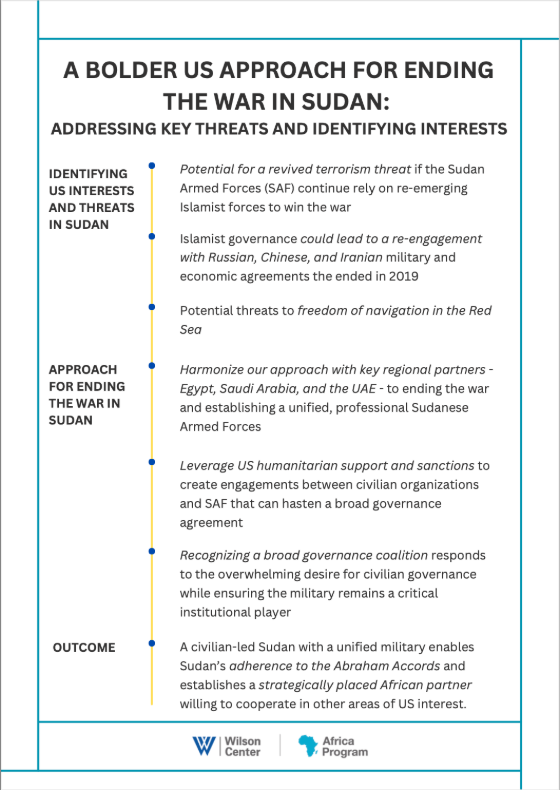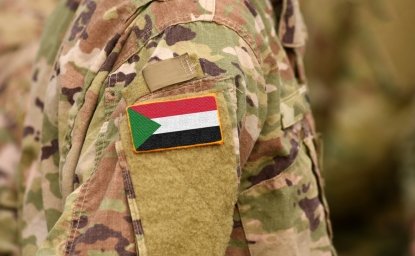Identifying US Interests and Threats in Sudan
The current conflict in Sudan poses serious potential threats to the United States. Most prominent is the threat of revived terrorism. The Islamist regime that governed Sudan for thirty years until 2019 hosted Osama bin Laden and other terrorist organizations that targeted the United States and Israel. From Sudan, Bin Laden’s Al-Qaeda planned the 1998 terrorist attacks on US embassies in East Africa and the 2000 attack on the USS Cole. The popular revolution in 2018 and 2019 ended that regime.
However, the Sudan Armed Forces (SAF) are now increasingly reliant on re-emerging Islamist political forces and armed militias with roots in the former regime to pursue its campaign against the Rapid Support Forces (RSF), which has committed genocide in some areas it controls. SAF leadership arguably relies on Islamist support because of a lack of viable alternatives rather than out of ideological alignment. A return of an Islamist government on the heels of a SAF victory could revive a terrorist threat to the United States. It could also result in the implementation of the prior regime’s agreement to grant Russia a naval base on the Red Sea, an expansion of Chinese economic influence, and a revival of regional security cooperation with Iran.
In addition to these being threats to US interests, including freedom of navigation in the Red Sea, they are undesirable outcomes for our key regional partners – Egypt, the UAE, and Saudi Arabia. Any Sudanese adherence to its Abraham Accords commitments would be reversed with a resurgence of Sudanese Islamist political forces. Cementing US influence in Sudan and achieving stability will only be achieved with the creation of a non-Islamist, democratic civilian government working with a unified, professional SAF.
Harmonizing Our Approach with Key Partners in the Region – Egypt, Saudi Arabia, and the UAE
The key to achieving sustainable peace and avoiding outcomes harmful to US interests lies in harmonizing the approach of regional partners. Currently, Egypt supports the SAF, while the UAE supports the RSF. The opening for getting Egypt and the UAE to cooperate lies in their shared desire to prevent the return of an Islamist regime. Saudi Arabia is not interested in seeing Sudan return to the pre-2019 status quo when Sudan was a constant supplicant for resources rather than a stable investment destination. There are indications that the UAE may be re-evaluating its support for the RSF in the face of the latter’s recent military setbacks. US engagement regarding Sudan should first and foremost focus on achieving an understanding with and among these three key regional partners on how to end the war via a deal that protects the US and regional partners’ core security, political, and economic interests in Sudan.
Reconciling Civilian and SAF Governance and Economic Interests
Achievement of US interests will also require Sudanese as well as regional cooperation. The 2018-2019 revolution demonstrated the overwhelming desire of the Sudanese for a democratic civilian government. A broad civilian peace coalition could accelerate the attainment of peace and the restructuring of governance. However, this is only possible if SAF leadership can be reassured that a unified, professional military would remain an institutional pillar and key economic player in a new Sudan.
There is already evidence that increasing numbers of Sudanese civilians see the SAF as a savior from the predatory actions of the RSF. In 2021, the SAF and RSF jointly overthrew the civilian transitional government mainly because the transitional government appeared to be moving aggressively to undermine SAF and RSF's economic interests. Recently, the SAF leadership indicated an openness to a transitional government. Going forward, there may be opportunities to work with a broader civilian coalition of political parties, civil society, and grassroots organizations, particularly if doing so would hasten the war’s end. The longer the fighting drags on, the more the SAF has to rely on Islamist and regional warlord militias, creating fragile coalitions and reducing the SAF’s overall control. This threatens the SAF’s objectives and US interests in the future. The considerable humanitarian assistance the US has provided in Sudan gives the US leverage with Sudanese civilians, particularly if more is directed to the grassroots “emergency response rooms.” And, the sanctions on SAF leadership provide the US the influence to strike a SAF-civilian deal.
A civilian-led Sudan with a unified professional military enables Sudan’s adherence to the Abraham Accords and establishes a strategically located African partner willing to cooperate in other areas of US interest."
A Unified, Professional Sudanese Armed Forces
Another key element required to make Sudan stable, governable, and attractive for investment by the US and regional partners is the formation of one sustainable national army. Convincing SAF leadership that the US is willing, working mainly through our key regional partners, to help form a unified, professional force could gain SAF cooperation both in protecting US interests and in putting Sudan on a path to democratic civilian rule. Some armed militias allied with the SAF may integrate willingly. Others may need inducements for both leaders and rank and file. Others may need to be subdued by force. Creating a unified, professional military is in the interests of our regional partners who want a reliable partner astride the Suez Canal, Red Sea, and Nile River. Therefore, they are well-suited to assist Sudan with this necessary task.
United States engagement with Sudan offers an opportunity both to avert likely dangerous outcomes for the US and build beneficial cooperation with key Middle Eastern partners. A civilian-led Sudan with a unified professional military enables Sudan’s adherence to the Abraham Accords and establishes a strategically located African partner willing to cooperate in other areas of US interest.








